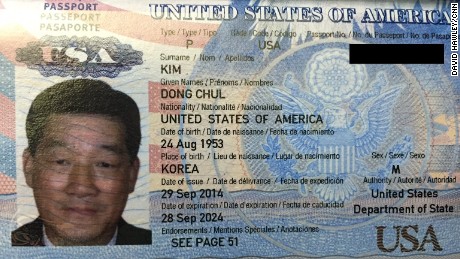North Korea sentences American to 10 years hard labor
North Korea sentenced a South Korean-born American citizen to 10 years of hard labor for subversion and espionage, a North Korean official told CNN.


Kim Dong Chul is the second American that North Korea has given a hard labor sentence in the past two months.A copy of Kim Dong Chul's passport provided by North Korea.
In March, University of Virginia student Otto Frederick Warmbier was sentenced to 15 years of hard labor for allegedly removing a political banner from a Pyongyang hotel.
CNN's Will Ripley spoke to Kim in January, after he said he had been in detention for three months.
Exclusive: North Korea reveals U.S. prisoner to CNN
Kim said he moved to Yanji, a Chinese city near the Chinese-North Korean border that acts as a trade hub between the two countries, in 2001. From Yanji, Kim said he commuted daily to Rason, a special economic zone on the North Korean side of the border, where he served as president of a company involved in international trade and hotel services.
According to Kim, he spied on behalf of "South Korean conservative elements" on the country's nuclear and military program.
"I was tasked with taking photos of military secrets and 'scandalous' scenes," he said at the time.
"They asked me to help destroy the (North Korean) system and spread propaganda against the government."
North Korea launches two midrange missiles; both tests fail
Kim's comments to CNN in January were made in the presence of North Korean officials which they cannot determine whether they were made under duress.
Like Kim, Warmbier also gave a confession to international media. North Korea accuses of the student of taking the banner at the urging of a church member, the CIA and a secretive university organization.The detainment of Americans and other foreign citizens is interpreted by North Korea watchers as the collection of bargaining chips.
"It shows anyone or anything can be used as political, military or economic leverage," Jasper Kim, Director of Ewha University's Center for Conflict Management said.
"I think the strategy by DPRK is to collect possible assets for leverage and basically, playing a game of geopolitical poker, unveiling cards strategically when they have the most value," he said, using an abbreviation for North Korea.
Kim, who was detained last October, was only revealed to have been held in January. He was sentenced a day after North Korea carried out two provocative (but failed) missile tests.
"The beginning of the year is particularly strategic, typically a lot of things happen at that point: the joint military exercises between US and ROK (South Korea), that occurs and this year in particular, Worker's Party congress which hasn't happened since 1980," Jasper Kim said.
What is the Worker's Party congress and why does it matter?
The "DPRK is definitely getting more aggressive, more erratic," he said.
SOURCE: CNN
Comments
Post a Comment